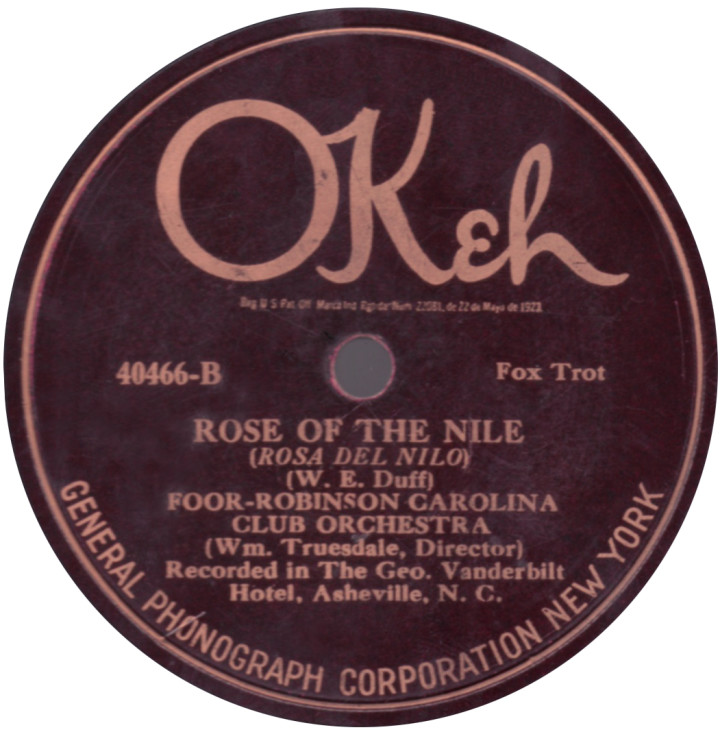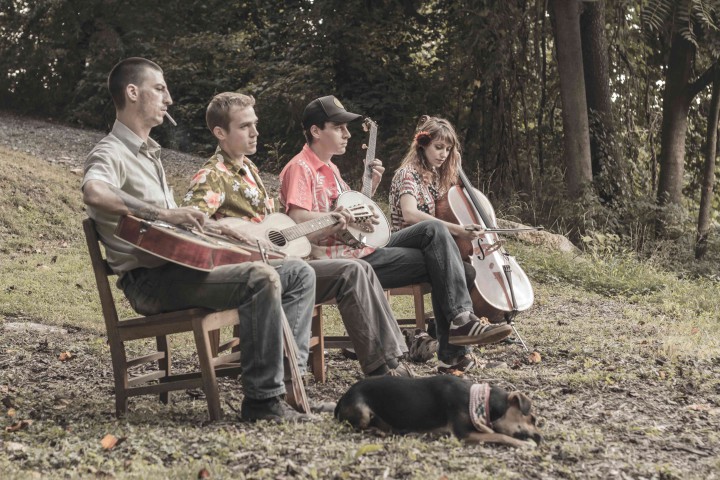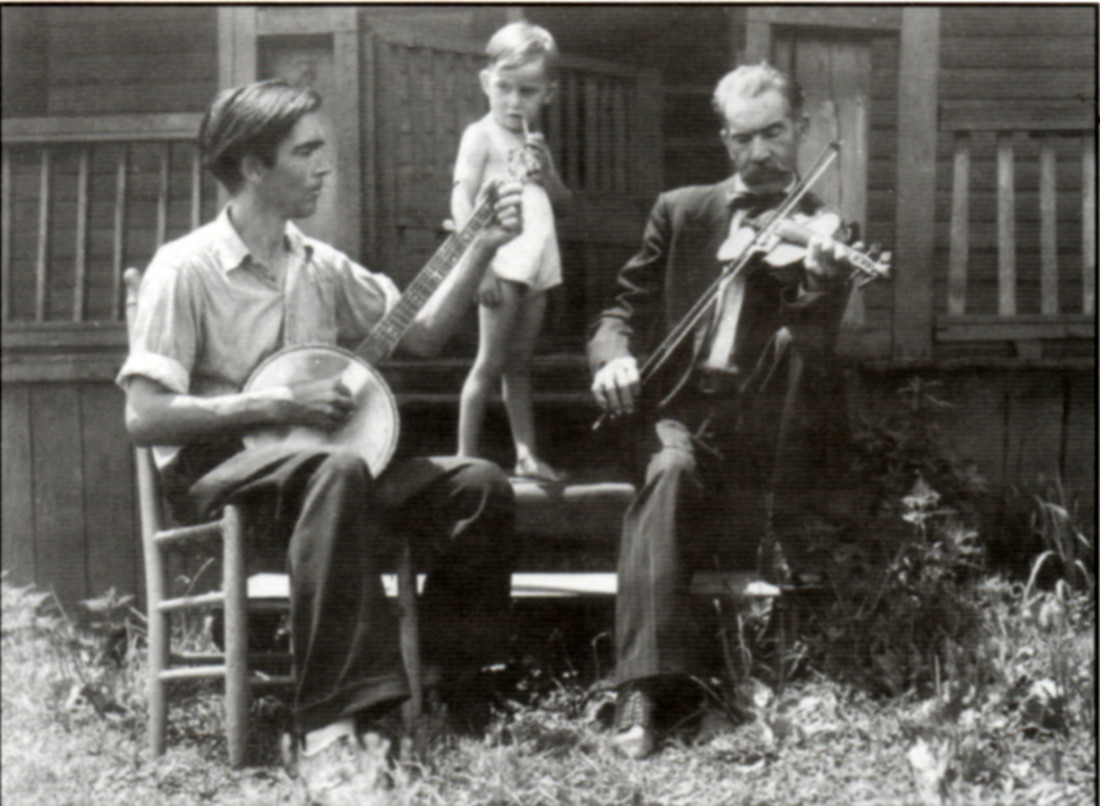Local country musician Brody Hunt is a lot of things — a recovering hobo, a butterfly rancher and a dedicated collector of 78-rpm recordings. “Every collector gets their own niche,” Hunt says. His is pre-World War II country blues, including hobo songs and artists associated with Asheville. “It’s a rabbit hole,” he says. “You go through it and you find all these gems that nobody knows about, and there comes a time when you want to share them.”
Through collecting and research, Hunt discovered the Okeh Record sessions that took place in Asheville nearly 100 years ago. The New York-based label, in a bid to discover lesser-known Southern musicians, took trips to various locations where, with a portable studio, its engineers pressed wax test records. The Asheville session, held the last week of August in 1925, attracted musicians and vocalists from around the region, with styles ranging from jazz and minstrel offerings to gospel and country. A total of 60 records were cut in a makeshift studio on the rooftop of the Vanderbilt Hotel. All are exceedingly rare because, soon after they were made, electric microphones replaced acoustic.
Even if the technology was outdated, says Hunt, many of the songs captured during the sessions were wildly innovative. To celebrate the 90th anniversary of those recordings, he’s planned a celebration — part listening party, part history talk, part concert — on Friday, Aug. 28, at White Horse Black Mountain.
 Former Xpress writer Kent Priestly recounted the 1925 sessions in a 2008 story, found at avl.mx/1dx. “More than Atlanta even, Asheville held the promise of ‘hill country’ talent. For one, [artist and recording director Ralph] Peer had a reliable informant in Bascom Lamar Lunsford, a Leicester song-catcher who practiced law,” Priestly wrote. “Peer wasn’t guided by any notions of historic preservation. He wasn’t a folklorist, and had no particular interest in the rustic arts. He’d come to Asheville in hopes of nosing out talent that would make his company money.”
Former Xpress writer Kent Priestly recounted the 1925 sessions in a 2008 story, found at avl.mx/1dx. “More than Atlanta even, Asheville held the promise of ‘hill country’ talent. For one, [artist and recording director Ralph] Peer had a reliable informant in Bascom Lamar Lunsford, a Leicester song-catcher who practiced law,” Priestly wrote. “Peer wasn’t guided by any notions of historic preservation. He wasn’t a folklorist, and had no particular interest in the rustic arts. He’d come to Asheville in hopes of nosing out talent that would make his company money.”
Among those who recorded during the Okeh sessions were: Ernest V. Stoneman, an autoharp player and ballad singer from Galax, Va.; West Asheville-based half-Cherokee multi-instrumentalist Ernest Helton; and fiddler J.D. Harris, who was living near Asheville at the time. But even though fiddles were prevalent and banjos even more so — and at a time that predated the popularity of clawhammer style — there were some surprises among the recordings. “When you listen to Fisher Hendley, it’s one of the most archaic things,” Hunt says of an artist performing a minstrel song with a particularly racist-sounding title. “But he’s singing from the black man’s perspective. It’s not a hateful thing. It’s a weird mix of different things he’d gleaned over the years and played in his own way.”

“Sticks and stones will break my bones / I know you’re gonna talk about me when I’m gone,” the song says. Hunt points out, “It’s like gangster rap. … It’s the archetypal traveling man [song]. It’s sheer unadulterated freedom.”
And then there was the Foor-Robinson Carolina Club Orchestra, the house band at the Vanderbilt Hotel, which cut the last track of the local Okeh session. That song, the decadent “Rose of the Nile,” is the only known 1920s-era Asheville-based jazz recording.
Beyond the songs captured on those August days in 1925, Hunt has also compiled material on Jimmie Rodgers, aka “The Singing Brakeman,” and minstrel performer Emmett Miller. Hunt’s collection includes “a few beautiful ads announcing the triumphant 1929 return of Jimmie Rodgers to Asheville, a town he had struggled in, living ‘on the bum’ for the six months prior to his first recordings and subsequent superstardom,” as he wrote in a letter to Xpress in 2011. Hunt’s research is archived in the North Carolina Room of Pack Memorial Library.
The local musician and historian plans to digitize his collection and create a program than can be shared with schools and other interested groups, and the White Horse Black Mountain celebration will offer a sort of preview of that presentation. Along with Hunt’s talk, during which he’ll play recorded selections — expect a good show; he also DJs for at the Burger Bar’s weekly Honky Tonk Ladies Night and has been part of Double Cown’s Country Classics — local musicians David Holt, Adam Tanner, Rayna Gellert and Hunt’s band, The Carolina Cud Chewers (with Antone Costa, Rachel Meirs and John James Tourville), will perform.
Though Hunt says that part of the heartbreak of his research has been discovering great (if obscure) WNC-based artists, only to learn they’d recently passed away, by sharing this music he hopes to give it new life. It’s also possible that the living relatives of some of the Asheville Okeh session musicians will be at the White Horse event. “The main thing is to show the vast variety of music that was here,” says Hunt. “Asheville in the ’20s was a hot town — there were Hawaiian bands, there were rooftop dances, there were killer jazz bands.”
He adds, “There were the Okeh sessions, but what was happening here on a regular basis … that’s just something people don’t know about, and I want to paint that picture.”
WHAT: Celebration of the 1925 Okeh recording sessions in Asheville, with David Holt, Adam Tanner, Rayna Gellert, Brody Hunt and the Carolina Cud Chewers
WHERE: White Horse Black Mountain, whitehorseblackmountain.com
WHEN: Friday, Aug. 28, 7:30 p.m. $12 advance/$15 at the door




Before you comment
The comments section is here to provide a platform for civil dialogue on the issues we face together as a local community. Xpress is committed to offering this platform for all voices, but when the tone of the discussion gets nasty or strays off topic, we believe many people choose not to participate. Xpress editors are determined to moderate comments to ensure a constructive interchange is maintained. All comments judged not to be in keeping with the spirit of civil discourse will be removed and repeat violators will be banned. See here for our terms of service. Thank you for being part of this effort to promote respectful discussion.